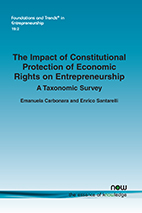The Impact of Constitutional Protection of Economic Rights on Entrepreneurship: A Taxonomic Survey
By Emanuela Carbonara, Department of Sociology and Business Law, University of Bologna, Italy, emanuela.carbonara@unibo.it | Enrico Santarelli, Department of Economics, University of Bologna, Italy, enrico.santarelli@unibo.it
Abstract
In this monograph we perform an in-depth analysis of 199 constitutional texts to single out the provisions that, by enhancing economic freedom in a country, are likely to create the institutional side of an entrepreneurial ecosystem favorable to new business creation. The relevant information on constitutions is extracted from the Comparative Constitutions Project: A Cross-National Historical Dataset of Written Constitutions (Elkins et al., 2009), a repository of valuable data on the formal characteristics of written constitutions for most independent states since 1789. Data on entrepreneurial activity in the countries taken into account in the empirical analysis are extracted from the World Bank Group Entrepreneurship Database. The study addresses a question of primary importance for the analysis of entrepreneurship: Does constitutional protection of principles and values which are commonly referred to as the “economic constitution” and which are usually associated with a country’s entrepreneurial activity, positively influence the rate of new firm formation and the total endowment of entrepreneurship capital in that country? We are able to give a positive answer to this question and this legitimates us to recommend inclusion of provisions prone to entrepreneurship in the constitution of any country.
The Impact of Constitutional Protection of Economic Rights on Entrepreneurship: A Taxonomic Survey
The Impact of Constitutional Protection of Economic Rights on Entrepreneurship: A Taxonomic Survey highlights how characteristics of the legal infrastructure of a country can create conditions that enhance new business creation. It is an exploration of the institutional determinants of entrepreneurship and the way these can affect the observed cross-country differences in the creation of new firms. The main aim is to analyze 195 constitutions, singling out the provisions that enhance economic freedom and are thus likely to create an institutional and legal setup favorable to new business creation. The study tries to answer a question of primary importance for the analysis of entrepreneurship. Does the constitutional protection of principles and values usually associated with a country’s endowment of entrepreneurship capital and presence of small firms positively influence the rate of new firm formation and the total endowment of entrepreneurship capital in that country?
The remainder of this monograph is structured as follows. Section 2 discusses the importance of institutions in shaping the entrepreneurship capital of a country and favoring the emergence of entrepreneurial ecosystems. Section 3 describes how higher-rank formal institutions represented by actual constitutional provisions affect the design of lower rank norms and regulations of primary importance for economic activity. Section 4 outlines the features of ‘economic constitutions’, i.e. of constitutional provisions playing a key role in the management of a country’s economy. Section 5 gives an overview of alternative measures of entrepreneurship and discusses their implications for empirical analysis. Section 6 focuses on the countries that have adopted the principles of ‘economic constitutions’ in their written constitutions and discusses the impact of the de jure and de facto implementation of such principles on entrepreneurship. Section 7 shows how the prevailing psychological traits of a country’s population may shape the impact of constitutional provisions on its proneness to entrepreneurship and sheds light on the relationship between constitutional provisions and the observed cross-country and cross-industry differences in labor productivity. Finally, Section 8 concludes and provides some recommendations for entrepreneurship policy.
